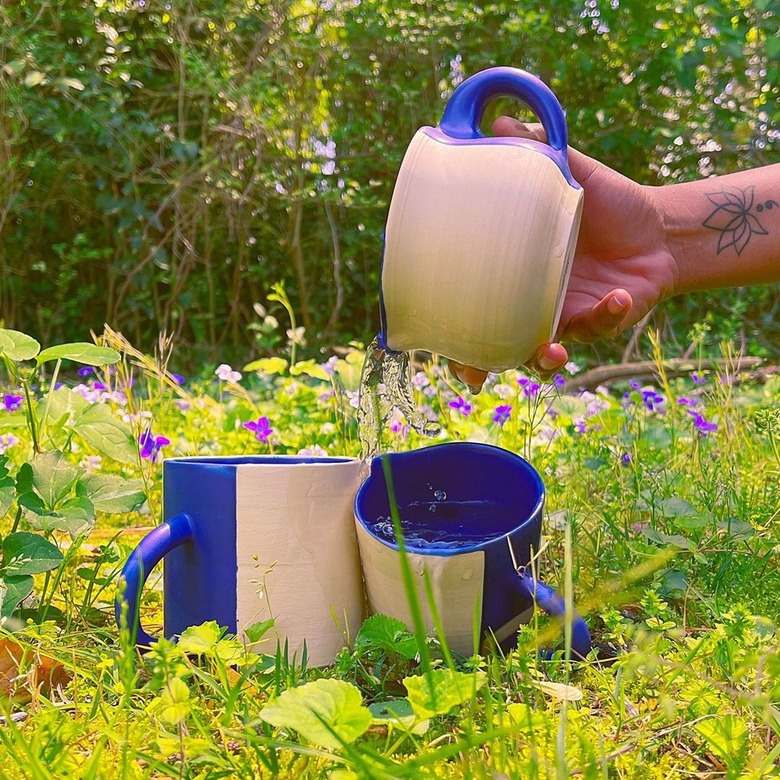This Collective Is By Black Ceramicists, For Black Ceramicists
Working under the motivation of "for us, by us," a new mutual aid network for Black ceramicists is building a space for creative exchange and care.
Kaabo Clay Collective is currently comprised of around 100 people who communicate largely via the messaging platform Discord to share resources, talk about materials, and brainstorm initiatives. It was started just this past March, and continues to grow.
Founding member Osa Atoe tells Hunker that the idea started through a conversation with fellow artist Yinka Orafidiya, in which they discussed the need for an all-Black social group. Atoe is also the creator of Pottery by Osa. When she saw a post by artist Simone Leigh referencing the United Order of Tents — an organization founded in the late 1860s by Annetta M. Lane that was a secret care network for the Black community — a few pieces started to fall into place.
"Whoever has an idea can bring it to the table and then use the collective as a resource to make that activity or event or scholarship or whatever it is a reality," Atoe tells Hunker.
Kaabo translates to "welcome" in Yoruba, correlating with the collective's mission to reach Black ceramicists worldwide. Most importantly, Atoe wondered what it would look like to create a collective that didn't focus on the white gaze, or other people's gaze, but, instead, benefited Black ceramicists directly. It's something many Black creators can relate to within the discipline.
"We've all experienced it being in these sort of non-Black-owned studios," founding member Sherród Faulks tells Hunker. "Having this venue in which to just be ourselves has been a really, really wonderful thing to have." Faulks is also the maker behind DEEP BLACK.
Around the anniversary of the murder of George Floyd, the collective started thinking of ways to create support. Members like Shalom Parker suggested ideas like a group exhibition with proceeds going to a good cause. But instead of donating to an organization, they decided to create a sale and give the funds directly to artists.
Kaabo Clay Collective Award for Black Ceramicists is a cash award "for a Black ceramicist of any skill level and educational background," according to the collective's website. The sale featured work by Roberto Lugo, Michelle Ettrick, Avé Rivera, April Adewole, and more. It raised a total of $6,000 and the application is currently open with a deadline of June 25.
"A few of the members suggested this idea of a susu, this West African sort of auction, is the closest idea to it. But that's really where the idea crystallized," Faulks tells Hunker. "It was really a group effort. It may not look like it, but it really was a collective effort and we're so much the better for it."
Atoe makes it clear that the group doesn't operate with a hierarchy of positions, like a president and vice president. She sees each member as a leader; some are already planning a Philadelphia meet-up to get to know each other offline.
"To my knowledge, there is not a group that is designed to take care of its members and to uplift the Black ceramic community at large," Faulks says. "We're sort of the first and kind of trailblazing. But the idea is not new. This is something that's sort of in our blood, for better or for worse, taking care of each other in this way."
Atoe has noticed that when Black artists are included in certain projects, it doesn't yield a symbiotic relationship. For example, she explains that sometimes galleries want to display more diverse artists — but they still take a portion of sales.
"I've been using the language of wanting to be subjects of action rather than objects of inclusion," Atoe tells Hunker. "I've had conversations where people have called me up being like, how do you think that we could bring more people of color to our residency program? I'm hesitant to even do this kind of work ... It's tiring and it's 2021. It still hasn't really been figured out. What is the antidote to that? The antidote to that is us having our own space rather than always trying to be included in somebody else's space."
Kaabo has also created a public directory of Black ceramicists — "beginners, experts, big brands, little brands, everyone," as Faulks explains.
"It's so easy to get lost on the sites and the events that are not owned by people of color," Faulks says. "We don't want to be the tokens. So having this site, having this directory being so large and public facing allows us to escape that narrative."
Atoe wants to make clear that the collective is "open to anybody who identifies as Black and a ceramicist." While there might be a more formal membership down the road, it will be at a sliding scale.
In the meantime, the founding members hope to host IRL meetings when things feel safe. They want to get together with other Black ceramicists to play with clay informally, laugh, chat, catch up, and just be in community with each other.
